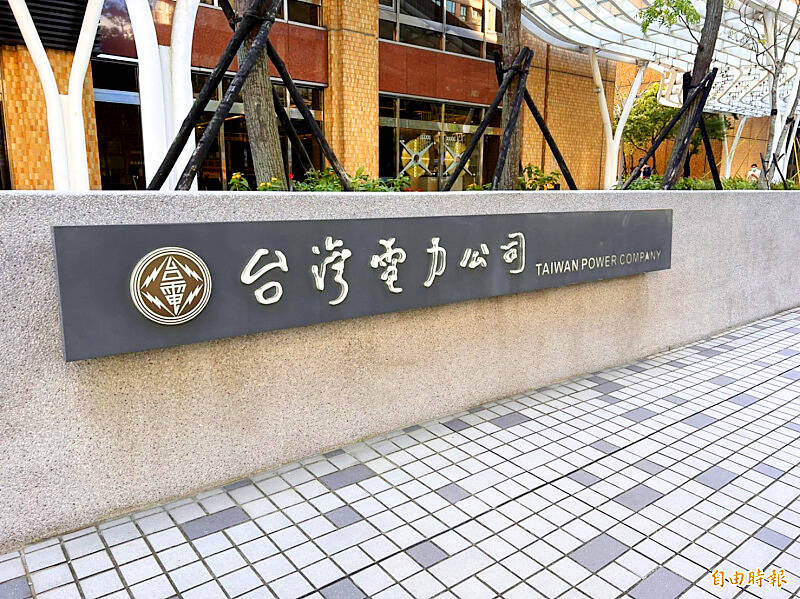The Control Yuan on Wednesday censured state-run Taiwan Power Co (Taipower) for mass blackouts that occurred across the nation for two days in May 2021 and on March 3 last year, which were caused by human error and grid failure at a power plant in Kaohsiung.
Eight officials were impeached and the cases are to be forwarded to the Judicial Yuan’s Disciplinary Court for adjudication, a statement issued by Tsai Chung-yi (蔡崇義) and two other Control Yuan members said.
The first power outage, on May 13, 2021, occurred when a contract worker from Taipower Kaoping Power Supply Branch made an error while conducting tests related to the expansion of an ultra-high-voltage substation in Kaohsiung’s Lujhu District (路竹), which led to a voltage drop that forced the Hsinta Power Plant in the city’s Yongan District (永安) to shut down, the statement said.

Photo: Lin Ching-hua, Taipei Times
As a result, Taipower was forced to implement six rounds of rolling power cuts over five hours that affected about 4.15 million households, the Control Yuan said.
A motion had been passed to impeach four former Taipower executives deemed responsible for the blackouts, including Wu Cing-mu (吳清木), then-head of Taipower Kaoping Power Supply Branch, for negligence, it said.
That instance of human negligence cost Taipower about NT$470 million (US$15 million) in compensation to the affected households and businesses, which took the form of discounted electricity bills, the Control Yuan said.
Four days later, on May 17, the malfunction of a generator at the Hsinta Power Plant occurred at about midday, causing another outage, and Taipower again implemented rolling blackouts that affected about 1 million households, it said.
Following its review, the Control Yuan censured Taipower and said it had determined that the blackouts were unnecessary because only one unit in the generator had failed.
It also censured Taipower for negligence during its annual maintenance at the Hsinta Power Plant that caused the lights to go off for close to 5.5 million households on March 3 last year.
The power cut began at 9:16am after a problem at the power plant and power was not fully restored until 9:31pm, affecting 5.49 million households and costing Taipower about NT$760 million in compensation.
Four former executives at the Hsinta Power Plant were impeached because of that blackout, the Control Yuan said.

Eight restaurants in Taiwan yesterday secured a one-star rating from the Michelin Guide Taiwan for the first time, while three one-star restaurants from last year’s edition were promoted to two stars. Forty-three restaurants were awarded one star this year, including 34 in Taipei, five in Taichung and four in Kaohsiung. Hosu (好嶼), Chuan Ya (川雅), Sushi Kajin (鮨嘉仁), aMaze (心宴), La Vie by Thomas Buhner, Yuan Yi (元一) and Frassi in Taipei and Front House (方蒔) in Kaohsiung received a one-star rating for the first time. Hosu is known for innovative Taiwanese dishes, while Chuan Ya serves Sichuan cuisine and aMaze specializes

Taitung County is to launch charter flights to Malaysia at the end of this year, after setting up flights to Vietnam and Thailand, the Taitung County Government said yesterday. The new charter flight services, provided by low-cost carrier Batik Air Malaysia, would be part of five-day tour packages for visits to Taitung County or Malaysia. The Batik Air charter flight, with about 200 seats, would take Malaysian tourists to Taitung on Dec. 30 and then at 12:35pm return to Kuala Lumpur with Taiwanese tourists. Another charter flight would bring the Taiwanese home on Jan. 3 next year, arriving at 5:30pm, before taking the

Taiwan High Speed Rail Corp. (THSRC) plans to ease strained capacity during peak hours by introducing new fare rules restricting passengers traveling without reserved seats in 2026, company Chairman Shih Che (史哲) said Wednesday. THSRC needs to tackle its capacity issue because there have been several occasions where passengers holding tickets with reserved seats did not make it onto their train in stations packed with individuals traveling without a reserved seat, Shih told reporters in a joint interview in Taipei. Non-reserved seats allow travelers maximum flexibility, but it has led to issues relating to quality of service and safety concerns, especially during

STATS: Taiwan’s average life expectancy of 80.77 years was lower than that of Japan, Singapore and South Korea, but higher than in China, Malaysia and Indonesia Taiwan’s average life expectancy last year increased to 80.77 years, but was still not back to its pre-COVID-19 pandemic peak of 81.32 years in 2020, the Ministry of the Interior said yesterday. The average life expectancy last year increased the 0.54 years from 2023, the ministry said in a statement. For men and women, the average life expectancy last year was 77.42 years and 84.30 years respectively, up 0.48 years and 0.56 years from the previous year. Taiwan’s average life expectancy peaked at 81.32 years in 2020, as the nation was relatively unaffected by the pandemic that year. The metric